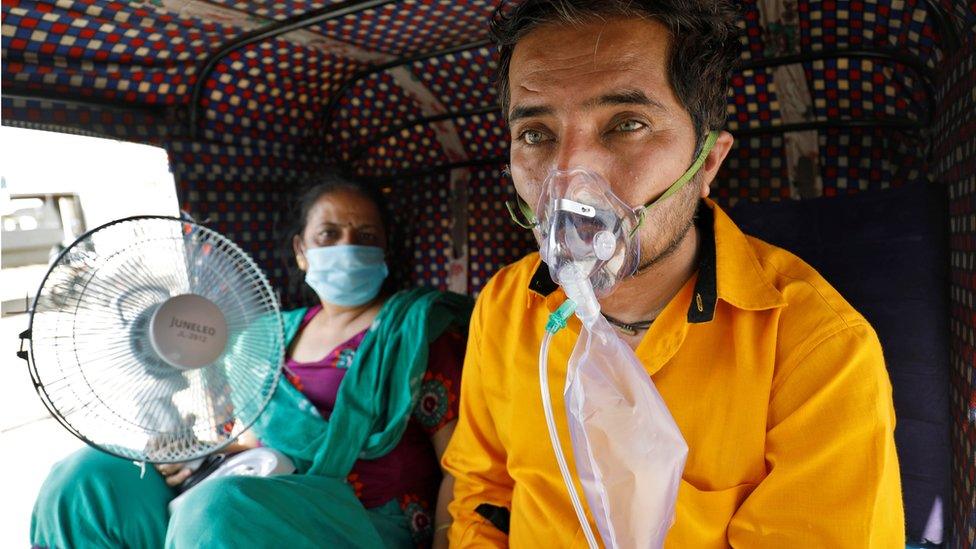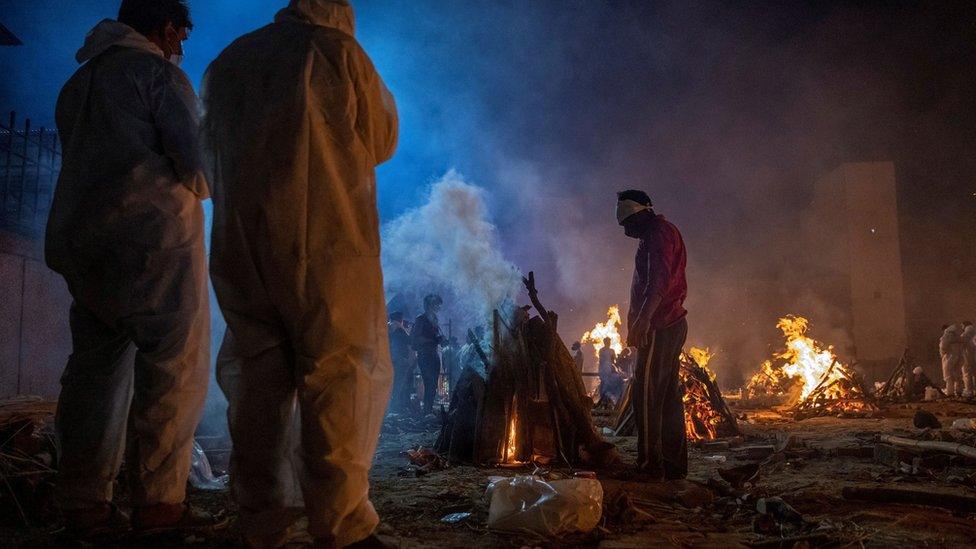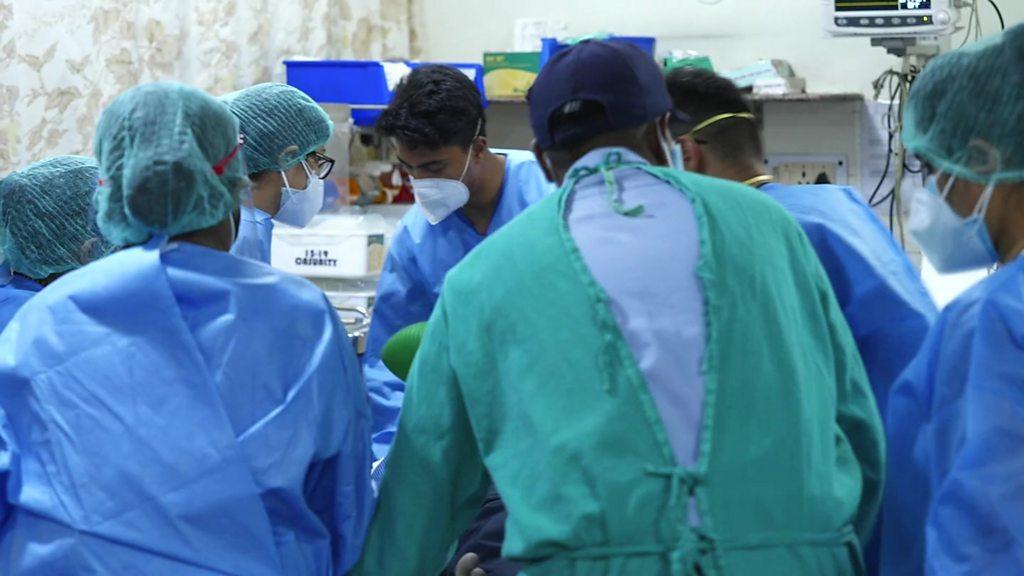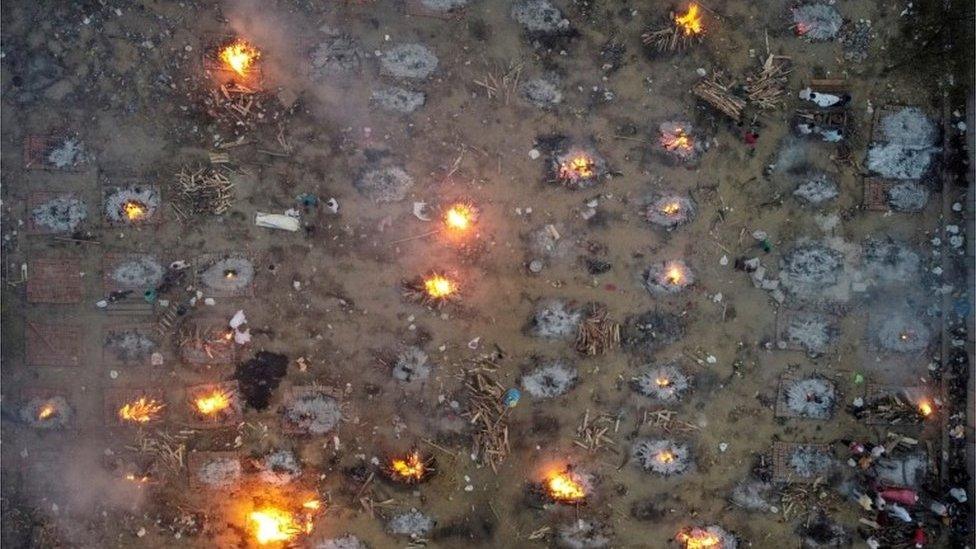Covid: Countries send aid to ease India's oxygen emergency
- Published
'A person cannot even die peacefully in Delhi'
International efforts are under way to help India as the country suffers critical oxygen shortages amid a devastating surge in Covid cases.
The UK has begun sending ventilators and oxygen concentrator devices. EU members are also due to send aid.
The US is lifting a ban on sending raw materials abroad, enabling India to make more of the AstraZeneca vaccine.
India's capital Delhi has extended its lockdown as overcrowded hospitals continue to turn patients away.
The government has approved plans for more than 500 oxygen generation plants across the country to boost supplies.
Meanwhile neighbouring Bangladesh has announced that it will close its border with India from Monday to prevent the spread of the virus.
India reported 349,691 more cases in the 24 hours to Sunday morning and another 2,767 deaths, however the true figures are thought to be much higher.
What is the UK sending?
The first consignment of aid left the UK on Sunday and is due to arrive in India on Tuesday. Further shipments will take place later in the week.
The aid includes 495 oxygen concentrators - which can extract oxygen from the air when hospital oxygen systems have run out - as well as 120 non-invasive ventilators and 20 manual ventilators.
"We stand side by side with India as a friend and partner during what is a deeply concerning time in the fight against Covid-19," UK Prime Minister Boris Johnson said in a statement.
The spike in infection has led to the cancellation of a planned visit by Mr Johnson to India and to a travel ban. Other nations, including the UAE, Canada, Germany and the Netherlands have also banned flights from India.
Allow X content?
This article contains content provided by X. We ask for your permission before anything is loaded, as they may be using cookies and other technologies. You may want to read X’s cookie policy, external and privacy policy, external before accepting. To view this content choose ‘accept and continue’.

What about the US and others?
The White House says it will immediately provide raw materials for vaccines to Indian vaccine manufacturers.
"Just as India sent assistance to the United States as our hospitals were strained early in the pandemic, we are determined to help India in its time of need," said President Joe Biden.
It follows calls by Indian officials and the Serum Institute of India (SII) for the US to lift export controls on raw materials for vaccines that were put in place in February.
Washington has also been criticised for delaying a decision on sending surplus vaccine doses abroad. The US has millions of unused doses of the AstraZeneca vaccine, which has not yet been approved for use there. Top infectious diseases expert Dr Anthony Fauci said the option of sending them to India was being considered.
The US will also provide medical equipment and protective gear. France meanwhile says it will provide oxygen.

A patient in an auto-rickshaw waiting to be allowed into a hospital in the city of Ahmedabad
In Brussels, the European Commission said it planned to send oxygen and medicine too. Its head Ursula von der Leyen said the organisation was "pooling resources to respond rapidly to India's request for assistance".
India's neighbour Pakistan - which has tense relations with Delhi amid territorial disputes - offered medical equipment and supplies and its Prime Minister Imran Khan tweeted prayers for a "speedy recovery". The country's Edhi foundation has also offered to send a fleet of 50 ambulances to India.
Allow X content?
This article contains content provided by X. We ask for your permission before anything is loaded, as they may be using cookies and other technologies. You may want to read X’s cookie policy, external and privacy policy, external before accepting. To view this content choose ‘accept and continue’.


India in crisis
Delhi is extending its lockdown for a second week
PM Narendra Modi urged people to exercise caution and get vaccinated
The Fortis Escorts Heart Institute, a private hospital in Delhi, said on Sunday it would not admit any more patients because of a shortage of oxygen
At least 20 people died on Saturday at the Jaipur Golden Hospital in Delhi because of a lack of oxygen

What is the situation in India?
In Delhi - a region of about 20 million people - hospitals are full and are turning away new patients. At least two hospitals have seen patients die after oxygen supplies ran out.
Relatives of sick people are appealing on social media for hospital places, oxygen supplies and ventilators. Some streets outside medical facilities have become crowded with the seriously ill, their loved ones trying to arrange stretchers and oxygen supplies for them as they plead with hospital authorities for a place inside.
Meanwhile testing capacity has also been overwhelmed and crematoria are working around the clock.
Jayant Malhotra has been helping at one crematorium in Delhi.
"I've never seen such a terrifying situation. I can't believe we're in the capital of India. People aren't getting oxygen and they're dying like animals," he told the BBC.
Similar scenes are playing out in other major cities. In total India has confirmed nearly 17 million infections and 192,000 deaths. Some states and territories have imposed lockdowns and other restrictions.

The true number of deaths is likely to be higher than the number provided by authorities
Health officials say more infectious variants have been driving the surge in infections, including the UK variant which has been found in Delhi, and a variant first detected in India in October.
There has been growing criticism of Prime Minister Modi's government for the country's lack of readiness for the second wave. Large religious gatherings and political rallies have been taking place.
On Sunday in a radio address Mr Modi said: "We were confident, our spirits were up after successfully tackling the first wave, but this storm has shaken the nation."
He also tweeted his condolences, external after it emerged that a famous classical Indian music singer, Rajan Mishra, had died in Delhi after suffering Covid-related health complications.
India's government has confirmed it asked Twitter to block tweets that were critical of the authorities' handling of the crisis, saying the tweets had contained misinformation and were against Indian law.
The social media platform blocked dozens of tweets from being seen in India - among them were tweets from a lawmaker named Revnath Reddy, a minister in the state of West Bengal named Moloy Ghatak and a filmmaker named Avinash Das, Reuters reported.
Meanwhile a newspaper group said it was suspending coverage of the country's flagship domestic cricket competition, external, the Indian Premier League, saying it was "incongruous" for the competition to be going ahead amid the surge.
- Published23 April 2021

- Published25 April 2021

- Published24 April 2021
- Published29 April 2021
